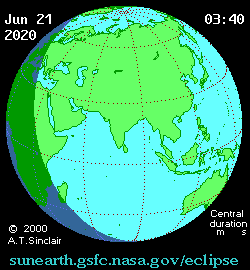Solar eclipse of June 21, 2020

An annular solar eclipse occurred on June 21, 2020. Annularity (the time that the sun looked like a ring) lasted thirty-eight seconds.
Background[change | change source]
A solar eclipse occurs when the Moon passes between Earth and the Sun. An annular solar eclipse occurs when the Moon's apparent diameter is smaller than the Sun's, blocking most of the Sun's light and causing the Sun to look like an annulus (ring).
This solar eclipse occurred one lunar year after the July 2, 2019 eclipse.
Visibility[change | change source]
The central path of this annular eclipse passed through parts of Central and Eastern Africa, including Congo Republic, DR Congo, the Central African Republic, South Sudan, Ethiopia, Eritrea, and Djibouti; the southern Arabian Peninsula, including Yemen, Oman, and southern Saudi Arabia; parts of South Asia and the Himalayas, including southern Pakistan, northern India, Nepal, and Tibet; parts of East Asia, including South China and Taiwan, and part of Micronesia, including Guam.[1]
Images[change | change source]
References[change | change source]
- ↑ "Annular Solar Eclipse on June 21, 2020". www.timeanddate.com. Retrieved 2019-12-26.


